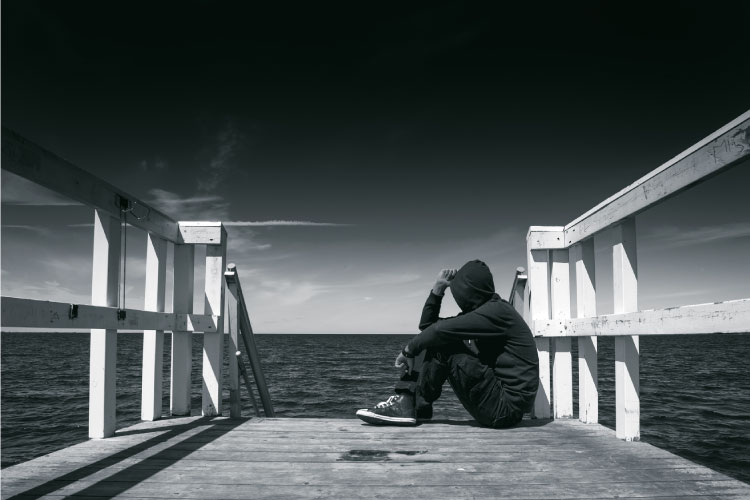
Depression can be ever-present, and symptoms can affect those in addiction recovery. Symptoms can include isolation, mood changes, emotional shifts, increased sleep, and increased anxiety.
Those who suffer from depression while in recovery from substance use disorder often report feeling hopeless that the misery will ever abate. They also express concern that they are unable to enjoy activities that once were pleasurable.
How Depression and Addiction Work Together
Through treatment, families are often encouraged to ‘detach with love’ to focus on their own mental health, emotional, and physical needs that have been neglected during the addiction of their loved one [1].
In a study that looked at depression in individuals, the most commonly reported feelings were loneliness, anxiety, and helplessness [2]. Like depression, we recognize addiction as a chronic disease that changes the brain structure and function. It tends to hijack the brain.
With addiction, the brain begins to store information about the person’s environment, triggers, and cues associated with the drug and getting high, this is what helps produce intense cravings.
These memories are conditioned, meaning the brain recalls intense cravings for the drug when these environmental cues are engaged [3].
Depression symptoms can then be a trigger for use as it may have been a prior coping skill to manage the disorder. It may also include stressful events which can trigger depressive episodes, increase substance abuse risk, and relapse.
Depression Affects Addiction
If an addict is ignoring any other co-occurring disorders, such as depression or anxiety, it can set them up for failure and potentially a relapse.
Often when a depressive episode strikes, it can lead to irritability toward others and themselves. This can lead to arguments with family members around not feeling up to attending family events and trigger a drinking or substance use episode [4].
 Isolation from others is another trigger for addiction use. Pulling away from loved ones when you sense that a depressive episode is occurring can trigger a relapse into addiction.
Isolation from others is another trigger for addiction use. Pulling away from loved ones when you sense that a depressive episode is occurring can trigger a relapse into addiction.
Isolation can also lead to thoughts about life before addiction. Sufferers may grieve what they have lost or what they once were. These thoughts can also trigger depressive episodes and then lead to relapse.
Stress, anxiety, loneliness, isolation, fatigue, family disagreements, arguing, and shorter daylight hours during the winter season, can lead to depressive episodes.
Fighting depression can be exhausting. Fatigue can also play a part in depression and increase isolation. Couple this with reduced sunlight hours during the winter and it can affect a person’s ability to ward off depression symptoms.
Past Triggers
Addiction, anxiety, and depression tend to play off each other. According to the National Alliance on Mental Health (NAMI), approximately 50% of those with a severe mental illness suffer from addiction [5].
Mental health disorders and addictions are intimately connected and can affect a person's recovery. It is important to learn to use effective coping skills in order to better manage depression, stress and ultimately the addiction.
 About the Author: Libby Lyons is a Licensed Clinical Social Worker and Certified Eating Disorder Specialist (CEDS). Libby has been practicing in the field of eating disorders, addictions, depression, anxiety and other comorbid issues in various agencies. Libby has previously worked as a contractor for the United States Air Force Domestic Violence Program, Saint Louis University Student Health and Counseling, Saint Louis Behavioral Medicine Institute Eating Disorders Program, and has been in Private Practice.
About the Author: Libby Lyons is a Licensed Clinical Social Worker and Certified Eating Disorder Specialist (CEDS). Libby has been practicing in the field of eating disorders, addictions, depression, anxiety and other comorbid issues in various agencies. Libby has previously worked as a contractor for the United States Air Force Domestic Violence Program, Saint Louis University Student Health and Counseling, Saint Louis Behavioral Medicine Institute Eating Disorders Program, and has been in Private Practice.
Libby currently works as a counselor at Fontbonne University and is an Adjunct Professor at Saint Louis University, and is a contributing author for Addiction Hope and Eating Disorder Hope. Libby lives in the St. Louis area with her husband and two daughters. She enjoys spending time with her family, running, and watching movies.
References:
[1] Wehrenberg, M. (2016, December 08). Family and Depression During the Holiday. Retrieved November 13, 2017, from https://www.psychologytoday.com/blog/depression-management-techniques/201612/family-and-depression-during-the-holiday
[2] Sansone, R. A., & Sansone, L. A. (2011, December). The Christmas Effect on Psychopathology. Retrieved November 13, 2017, from https://www.ncbi.nlm.nih.gov/pmc/articles/PMC3257984/
[3] Publishing, H. H. (n.d.). How addiction hijacks the brain. Retrieved November 13, 2017, from https://www.health.harvard.edu/newsletter_article/how-addiction-hijacks-the-brain
[4] Struggles with Substance Abuse During the Holiday Season. (2017, May 18). Retrieved November 13, 2017, from http://aforeverrecovery.com/blog/addiction/struggles-holiday-season-substance-abuse/
[5] Holiday blues cause myriad challenges for recovering addict, alcoholic. (2017, June 27). Retrieved November 13, 2017, from https://emeraldcoastjourneypure.com/addiction-holiday-blues/
The opinions and views of our guest contributors, are shared to provide a broad perspective of addictions. These are not necessarily the views of Addiction Hope, but an effort to offer a discussion of various issues by different concerned individuals.
We at Addiction Hope understand that addictions result from a combination of environmental and genetic factors. If you or a loved one are suffering from an addiction, please know that there is hope for you, and seek immediate professional help.
Published on April 24, 2018
Reviewed by Jacquelyn Ekern, MS, LPC on April 30, 2018
Published on AddictionHope.com
